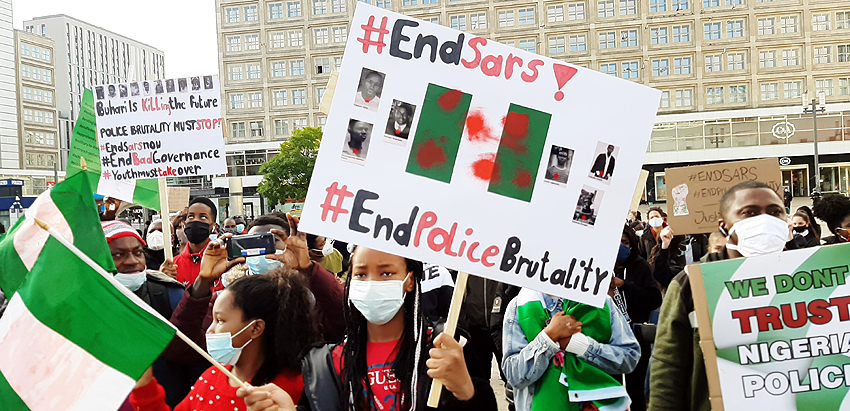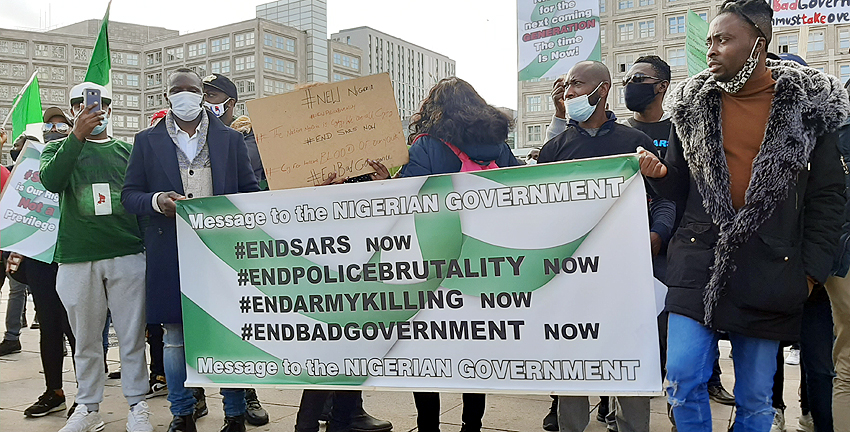More than a thousand Nigerians turned up at the Alexanderplatz in Berlin on Saturday, 24 October, to continue the protests against police brutality and bad governance in their country.
The demonstrations, under the #EndSARS hashtag, began with calls on the government of President Muhammadu Buhari to scrap the Special Anti-Robbery Squad (SARS). This police unit has become infamous for its human rights abuses.
Amnesty International says the SARS unit has been behind many human rights violations in the country. “Since 2016 Amnesty International has been receiving reports from lawyers, human rights defenders and journalists and collected testimonies stating that some police officers in SARS regularly demand bribes, steal and extort money from criminal suspects and their families,” AI reported.

It added that its research “exposed the callous workings of a police squad operating outside of the law and inflicting daily brutality on Nigerians who are often legally powerless to defend themselves against criminal accusations, let alone from the torture meted out by SARS.”
Even though the government announced the ban of the unit with the creation of a new Special Weapons and Tactics (SWAT) as replacement, young people in Nigeria continued to peacefully protest until they were shot at by soldiers at the Lekki Toll Gate in Lagos last week, after a curfew was declared.
The country has since been thrown into upheaval with several cities experiencing looting and destruction of public and private businesses despite the imposition of curfews, in a rare expression of popular displeasure with those governing the country. In a nationwide broadcast on Thursday, President Buhari sidestepped the military attacks on peaceful protesters but instead focusing on the government’s attempts to distribute funds to young people and businesses during the Covid-19 pandemic. It was a speech that was lacking in empathy.

Saturday’s protest in Berlin, like in other German cities such as Frankfurt, Bremen and Munich, was peaceful as speakers called attention to the atrocities going on back in Nigeria. The protesters presented a seven-point agenda to the Nigerian government that included institutional reforms, reduction in the cost of governance, constitutional reforms, education reforms, health reforms, youth affairs reforms and public office reforms.
READ ALSO #EndSARS: EU Parliamentarian on what Nigeria needs now
One of the speakers, Ikechukwu Uzoma, told The African Courier that the demonstration is a “manifestation of the anger and the displeasure of Nigerians against high-handed leadership and the use of lethal force against peaceful protesters.”
“We are calling for institutional and police reforms, we are calling for the restructuring of the country to work for every Nigerian,” Uzoma said.
One speaker called on the government of Germany to look into the situation in Nigeria to help forestall chaos that could result in the creation of refugees.

Nigerian writer and satirist Elnathan John told The African Courier that the Nigerian government had failed to uphold its “social contract” with the people that it governs.
“The Nigerian police and the security forces have resorted to their usual modus operandi, which is shooting and killing innocent civilians. I think Nigerians have had enough and it is time to speak to the government, especially a government that is unresponsive and refuses to engage with the masses on any humane level,” John said.
While the protests in Nigeria have ended over the last week, continued demonstrations around the world, like the one in Berlin, are the only ways to keep the Nigerian situation top of mind and keep the Nigerian government on its toes.
Lolade Adewuyi
READ ALSO UN, US and EU condemn massacre of peaceful youth protesters in Lagos
 THE AFRICAN COURIER. Reporting Africa and its Diaspora! The African Courier is an international magazine published in Germany to report on Africa and the Diaspora African experience. The first issue of the bimonthly magazine appeared on the newsstands on 15 February 1998. The African Courier is a communication forum for European-African political, economic and cultural exchanges, and a voice for Africa in Europe.
THE AFRICAN COURIER. Reporting Africa and its Diaspora! The African Courier is an international magazine published in Germany to report on Africa and the Diaspora African experience. The first issue of the bimonthly magazine appeared on the newsstands on 15 February 1998. The African Courier is a communication forum for European-African political, economic and cultural exchanges, and a voice for Africa in Europe.


